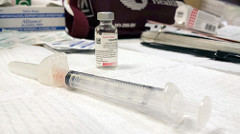Every year, we are reminded all around us by advertisements, pharmacies, doctors, even family members to get our flu shot so we won’t get sick! However, there are some that are skeptical when they see flu shot advertisements and campaigns. The general public debates on whether this shot actually does anything beneficial and are skeptical when reports come out every year of vaccines not being as effective as they should be or deaths from the flu such as this article here.

Flu virus coming into contact with cell. Source : Flickr Commons
So, to be a voice of reason in this massive debate, one first needs to understand how the flu shot actually works and why there have been past years where the flu shot has failed tremendously or has had huge success in keeping people healthy.
How it’s made
Between flu seasons (Spring-Summer), scientists’ study previous month’s “flu-trends” and base the vaccine they make for the year on this information. The influenza vaccine is first made in lab months prior to our annual “flu-season” (Fall through Winter) and then injected into hen eggs where the virus can multiply. The next step in the process requires the virus to enter a weakened, inactivated state. This inactive state prevents the virus from further mutation in the human body, which would otherwise consist of flu symptoms. Vaccines are then made with the inactivated flu virus.
How it works
The timeline for this process can be problematic in that the preparation of the vaccine occurs months before the current strain of influenza affects the general population. The time which the vaccines are modeled after the flu virus strains to when people can actually receive the flu shot is approximately 6 months prior to distribution. This leaves plenty of time for the flu virus to further mutate. This is why in some flu seasons the vaccine can target the completely wrong strain of influenza, thus leading to a useless vaccine.

Flu Vaccine Source : Flickr Commons
However, according to the Centre for Disease Control and Prevention (CDC), flu vaccines can reduce the risk of illness and symptoms by 40%-60% on a good year when the vaccine closely matches the circulating strain.
Now to answer the question; Does the flu vaccine really work? The answer I believe most accurate is yes. Although there is potential for the flu strain to mutate to something that does not match the vaccine exactly, little protection is better than no protection, and by getting the flu shot you are not only protecting yourself but also those around you.
-Morgan Strohan
